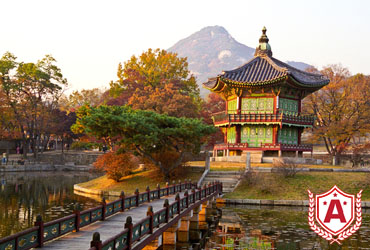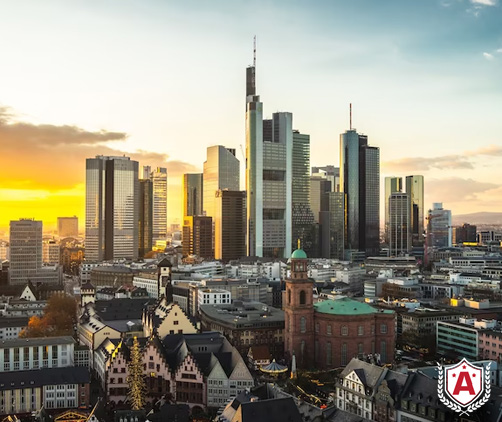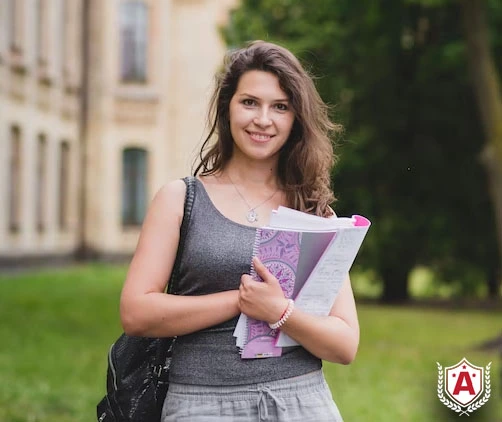Updated on May, 23 2024 06:55 IST
 Those who want to become successful professionals with adequate and exceptional skills can pursue higher studies in South Korea. The nation's primary goal is to provide pupils with an education. In 2017, more than 123,000 international students flocked to South Korea, and the government has set its sights even higher, aiming for 200,000 international students by 2023. As part of this ongoing focus on internationalization, several South Korean universities, including Yonsei University, are opening new international campuses to meet the growing demand.
Those who want to become successful professionals with adequate and exceptional skills can pursue higher studies in South Korea. The nation's primary goal is to provide pupils with an education. In 2017, more than 123,000 international students flocked to South Korea, and the government has set its sights even higher, aiming for 200,000 international students by 2023. As part of this ongoing focus on internationalization, several South Korean universities, including Yonsei University, are opening new international campuses to meet the growing demand.
South Korea, among other things, has the highest educated workforce in the world. A fantastic option for higher studies, 'South Korea' has been appropriately dubbed "education fever" as it is one of the most educated countries in the world. The East Asian nation has become a popular study destination thanks to its numerous degree and skill development courses, state-of-the-art facilities, modern infrastructure, and scholarship programs.
South Korea is great for those who want to save money as the country offers low-cost yet superior education standards.
Schools and universities in South Korea boast high-quality state-of-the-art technology.
The professors have years of expertise in teaching students in a classroom setting with an optimal teacher-to-student ratio.
The South Korean educational curriculum uses sophisticated, up-to-date techniques and is at par with global standards.
South Korea's educational institutions use current teaching methods and are significantly improving their global rankings.
South Korean education offers great employability, increasing chances of working worldwide.
Although Korean is the official language of the East Asian country, the number of English-taught programs has expanded over time.
South Korea is entirely secure for overseas students. Seoul was also ranked eighth in the EIU's Safe Cities Index report in 2019.
Students in South Korean educational institutions can gain foreign experience and learn about different cultures. Connecting with peers and professionals from all across the world can help you extend your network.
In comparison to other countries, South Korea's living cost is lower.
The weather is milder, which is ideal for everyone.
Students who study here gain international-level global skills.
Students are allowed to work part-time for up to 20 hours a week during their studies.
South Korea's expansion into the world's 11th-largest economy and Asia's fourth-largest economy has been fueled by investments in education and research. South Korea is known for its technological, entertainment, and media openness. But it's also a country with a long, rich, and complex political past, making it a great spot for learning social sciences and history.
Here are some top courses to keep an eye out for in South Korea:
Business Studies/Business Administration/Management studies
Civil Engineering Degrees
Arts & Literature
Information Technology
Electrical Engineering
Mechanical Engineering
Environmental Technology
Medical Sciences
Languages Degrees
Music Degrees
Economics
Natural Sciences
Social Sciences
South Korea has around 370 official higher education providers, so interested students will have abundant options to choose from. Here are some of the top universities in South Korea:
Seoul National University
Yonsei University
Korea Advanced Institute of Science and Technology
Pohang University of Science and Technology (POSTECH)
Korea University
Sogang University
Catholic University of Korea
Ewha Woman's University
Gyeongju University
Hanyang University
Sejong University
Catholic University of Daegu
University of Suwon
Woosong University
Dongguk University
International students who learn the Korean language before beginning their degree program can apply for scholarships, which are frequently available from particular colleges and can pay up to 100% of tuition costs. However, the scholarship allowances are subject to change and actual contract.
Indian students can get the following scholarships:
Yonsei University Scholarship For Undergraduate Program
The Undergraduate Korean Government Scholarship
Korean Government Scholarship Program
Global Korea Scholarship (GKS)
GIST Scholarship
GKS for ASEAN Nations
Korea University Scholarship for Graduate and Undergraduate Program
Seoul National University Scholarship For Graduates And Undergraduates
UST Scholarships
International graduate students can apply for a scholarship from the Republic of Korea for one of the following courses:
Master’s course: For three years which will include one year of Korean language course & 2 years of master’s course.
Doctoral course: For four years. This will include one year of Korean language course & 3 years of doctoral course. Scholarship payment will include a monthly allowance of 900,000 won per month, a research allowance of 240,000 won for students in natural and mechanic sciences & 210,000 won for students in humanities and social sciences per semester, a relocation allowance of 200,000 won upon arrival, a round-trip economy class ticket, tuitions, where the host institution exempts the full entrance fee. The full tuition is exempted by NIIED. Up to 500,000 won in dissertation printing costs will be reimbursed & up to 800,000 won for a course in art or physical education. Language training fees for up to 1 year will be directly paid to the entrusted language institution by NIIED. The scholarship also includes medical insurance of 15,000 won per month.
Before applying to any program, you must clearly understand what you want to study. So, first, pick a course, and then decide where you wish to study. Check your chosen institute's qualification requirements. You should also learn the South Korean language before going to South Korea to study. This will make it easier for you to communicate with the locals.
Though, the academic year in South Korea, begins in March each year, many schools accept new students in September as well. The deadline for March entries is set between September and November, while the same for September is around May and June. However, different colleges have different admission dates. Thus, students should check with their chosen university. Please keep in mind that a few courses begin in August/September. The admissions process varies by school, but you can generally apply directly to your desired university via mail or the internet.
Apply for the course at the chosen university, and wait for the acceptance letter.
Submit the application form along with the required documents.
Pay the tuition fees after receiving the acceptance letter from the university,
Apply for a visa at the nearest South Korean Embassy.
Book your tickets to South Korea.
In order to study in Bachelor, Master, or Ph.D. programs in South Korea, you will need a D-2 Visa for Regular Educational Programs. A processing fee of around US$50 for a single entrance or US$80 for multiple entries is required for your D-2 visa. You can stay for up to two years on this visa. Engineering students can apply for the D-2-7 visa, which allows overseas students who the government has invited to stay in South Korea after graduation and find work. You can get a visa from a South Korean embassy or consulate in your home country. You'll also need to buy health insurance from the National Health Insurance Service (NHIS), which costs roughly $20 per month and gives you access to care at all hospitals in the country.
CV
Application forms
Invitation letter from your chosen university
Authenticated Secondary School Leaving Certificate
Scorecards of high-school education
Certificate/diploma from last graduated school
Recommendation Letter
Statement of Purpose/ Personal statement
Valid international passport and visa
English proficiency certificate - IELTS or TOEFL
Korean proficiency certificate
Health Insurance
Medical and mental fit certificate
COVID-19 vaccination certificate
Passport size photograph
Financial statements
The following are the main prerequisites for international students to study in South Korea:
Candidates for undergraduate studies in South Korea must have completed 10+2, or 12 years of education (primary and secondary).
For postgraduate courses, a bachelor's degree is required to apply for a master's program.
A master's degree is required to apply for a Ph.D.
If you're applying for English-taught courses in South Korea, you'll need to submit TOEFL scores.
For Korean-taught programs, you'll need to take the Test of Proficiency in Korean (TOPIK) and submit your TOPIK results with your application.
For Indian students looking for a low-cost international education, studying in South Korea is a once-in-a-lifetime opportunity. A large number of students migrate to South Korea to pursue an international education and the opportunity to live and study in one of the world's fastest-growing nations. In the country's active and diversified student community, Indian students would have several possibilities to meet other international and Indian students. While earning a world-class education, study in South Korea and explore stunning landscapes and ancient historical icons. South Korea is a glowing destination with quality education, various scholarships, and scopes for employability.
| Purpose | Expense |
|---|---|
| Dormitories | $600 - $1,400 (Per Semester) |
| Boarding House | $300 - $600 (Per Semester) |
| Rented Apartments | $300 (Per Semester) |
| Food (on-campus) | $260 (per month) |
| Public Transport (monthly pass) | $50 |
| Other Expenses (medical insurance, internet, stationery, etc.) | $400 - $500 |
Food in South Korea has risen in popularity in recent times. Indian students will find ample food options - from on-campus catering to Indian eating joints. As there are several Indian students, you will find good quality authentic Indian food around the universities. Students can also try famous South Korean food like Bibimbap, Bulgogi, Hoeddeok, and Kimchi.
Apart from immense part-time job prospects for international students, South Korea, offers a financially secure future for students after graduation. South Korea's employment opportunities are endless as one of the most industrialized members of the Organisation for Economic Co-operation and Development and one of the G-20 major countries. It has become possible due to the collaborations the South Korean colleges have formed with various recruiters from various industries. The most prominent sectors for jobs include Vehicle Manufacturing, Telecommunications, Semiconductors and Electronics, Information Technology, Research and Development, Steel and Chemical Sectors, Editor/Content Writer, Teaching, etc. South Korean markets are competitive, but if you are fluent in the language, your Korean degree and foreign experience can help you stand out. Among Indian students, the IT sector is the most popular. Indian students may be able to discover better work opportunities as a result of the country's expanding political ties. Learning the Korean language will be an added advantage in your career course in South Korea.
Anigdha, a recognized education consultancy organization, is committed to assisting students in choosing the most appropriate education possibilities in South Korea. Because Anigdha is affiliated with prestigious South Korean institutions, several students have placed their trust in us. We guarantee 100% legitimate consulting and services as a reputed and trusted firm.
 South Korea, officially known as the Republic of Korea, is a developed country in East Asia. The country, along with Hong Kong, Singapore, and Taiwan, is renowned as one of the four 'Asian Tiger' economies because of its investment and growth in innovation and technology. North Korea is located on the Korean Peninsula; the country shares its only land border with China to the west, over the Yellow Sea, and Japan to the east, across the East Sea. For its spectacular natural splendor of mountains and clean lakes, it is known as the 'Land of the Morning Calm.'
South Korea, officially known as the Republic of Korea, is a developed country in East Asia. The country, along with Hong Kong, Singapore, and Taiwan, is renowned as one of the four 'Asian Tiger' economies because of its investment and growth in innovation and technology. North Korea is located on the Korean Peninsula; the country shares its only land border with China to the west, over the Yellow Sea, and Japan to the east, across the East Sea. For its spectacular natural splendor of mountains and clean lakes, it is known as the 'Land of the Morning Calm.'
How long does it take to obtain a student visa in South Korea to study?
If you want to study in South Korea, you should apply for a visa at least 30 days before starting the course. The visa typically takes ten days to be issued.
Why is South Korea becoming a popular destination for higher education?
South Korea has become a popular destination as the country has invested significantly in education and research. Apart from this, South Korean schools and universities offer many courses and boast cutting-edge technologies and education standards.
Is it expensive to live in South Korea?
South Korea is among the most affordable destinations for higher studies compared to other global destinations.
Is South Korea safe for international students?
Yes, South Korea is a safe country for international students.
Are there English-taught courses in South Korea?
South Korea is an appealing destination for students seeking an international degree, as it offers several English-taught programs.
Get free 1-on-1 counselling with our experts

Are you looking to expand your education abroad and experience all that Germany ...
October, 28 2025
Germany offers a wide range of opportunities for students to pursue higher studi...
October, 28 2025
Germany is one of the most attractive places for international students due to i...
October, 28 2025
Are you thinking about studying for a masters in engineering in Germany? If so, ...
October, 28 2025
If you are looking for a new job in Germany, or if you are an expat considering ...
October, 28 2025
There are a variety of scholarships available in Germany, from government-sponso...
October, 28 2025
In recent years, more and more students have chosen to study in Germany. This be...
October, 28 2025
If you're looking for a way to make some extra cash while you're studying, Germa...
October, 28 2025